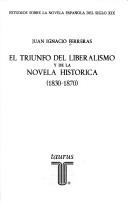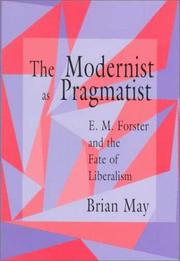| Listing 1 - 10 of 50 | << page >> |
Sort by
|

ISBN: 843062094X Year: 1976 Publisher: Madrid
Abstract | Keywords | Export | Availability | Bookmark
 Loading...
Loading...Choose an application
- Reference Manager
- EndNote
- RefWorks (Direct export to RefWorks)
Fiction --- Spanish literature --- anno 1800-1899 --- Historical fiction, Spanish --- Liberalism in literature. --- Spanish fiction --- History and criticism. --- Liberalism in literature --- History and criticism
Book
ISBN: 1421440911 9781421440927 9781421440903 1421440903 142144092X 9781421440910 Year: 2021 Publisher: Baltimore
Abstract | Keywords | Export | Availability | Bookmark
 Loading...
Loading...Choose an application
- Reference Manager
- EndNote
- RefWorks (Direct export to RefWorks)
A revisionist history of American liberalism, from the Great Depression to the Cold War.In Making Liberalism New, Ian Afflerbach traces the rise, revision, and fall of a modern liberalism in the United States, establishing this intellectual culture as distinct from classical predecessors as well as the neoliberalism that came to power by century's end. Drawing on a diverse archive that includes political philosophy, legal texts, studies of moral psychology, government propaganda, and presidential campaign materials, Afflerbach also delves into works by Tess Slesinger, Richard Wright, James Agee, John Dewey, Lionel Trilling, and Vladimir Nabokov. Throughout the book, he shows how a reciprocal pattern of influence between modernist literature and liberal intellectuals helped drive the remarkable writing and rewriting of this keyword in American political life.From the 1930s into the 1960s, Afflerbach writes, modern American fiction exposed and interrogated central concerns in liberal culture, such as corporate ownership, reproductive rights, color-blind law, the tragic limits of social documentary, and the dangerous allure of a heroic style in political leaders. In response, liberal intellectuals borrowed key values from modernist culture--irony, tragedy, style--to reimagine the meaning and ambitions of American liberalism.Drawing together political theory and literary history, Making Liberalism New argues that the rise of American liberal culture helped direct the priorities of modern literature. At the same time, it explains how the ironies of narrative form offer an ideal medium for readers to examine conceptual problems in liberal thought. These problems--from the abortion debate to the scope of executive power--remain an indelible feature of American politics.
Modernism (Literature) --- Literature and society --- Liberalism in literature --- American fiction --- History --- History and criticism --- United States. --- United States --- Intellectual life --- Liberalism in literature. --- History and criticism.

ISBN: 0826210961 Year: 1997 Publisher: Columbia, MO : University of Missouri Press,
Abstract | Keywords | Export | Availability | Bookmark
 Loading...
Loading...Choose an application
- Reference Manager
- EndNote
- RefWorks (Direct export to RefWorks)
Liberalism in literature. --- Liberalism --- Modernism (Literature) --- Politics and literature --- Pragmatism in literature. --- History --- Forster, Edward Morgan
Book
ISBN: 0748699562 9780748699568 9780748699551 0748699554 9780748688568 9781474410779 1474410774 9781474410779 Year: 2022 Publisher: Edinburgh
Abstract | Keywords | Export | Availability | Bookmark
 Loading...
Loading...Choose an application
- Reference Manager
- EndNote
- RefWorks (Direct export to RefWorks)
Examines the full stylistic range of the novels and biographies which Trollope explored in his final decade
Liberalism in literature. --- Trollope, Anthony, --- Trollop, Antonio, --- Trollop, Antoni, --- Literary style. --- Criticism and interpretation.
Book
ISBN: 100901904X 100902213X 1316519813 1009021931 Year: 2022 Publisher: Cambridge : Cambridge University Press,
Abstract | Keywords | Export | Availability | Bookmark
 Loading...
Loading...Choose an application
- Reference Manager
- EndNote
- RefWorks (Direct export to RefWorks)
Liberalism and American Literature in the Clinton Era argues that a new, post-postmodern aesthetic emerges in the 1990s as a group of American writers - including Mary Gaitskill, George Saunders, Richard Powers, Karen Tei Yamashita, and others - grapples with the political triumph of free-market ideology. The book shows how these writers resist the anti-social qualities of this frantic right-wing shift while still performing its essential gesture, the personalization of otherwise irreducible social antagonisms. Thus, we see these writers reinvent political struggles as differences in values and emotions, in fictions that explore non-antagonistic social forms like families, communities and networks. Situating these formally innovative fictions in the context of the controversies that have defined this rightward shift - including debates over free trade, welfare reform, and family values - Brooks details how American writers and politicians have reinvented liberalism for the age of pro-capitalist consensus.
American fiction --- Literature and society --- Modernism (Literature) --- Liberalism in literature. --- History and criticism. --- History
Book
ISBN: 0823294609 0823294587 0823294617 Year: 2021 Publisher: New York : Fordham University Press,
Abstract | Keywords | Export | Availability | Bookmark
 Loading...
Loading...Choose an application
- Reference Manager
- EndNote
- RefWorks (Direct export to RefWorks)
"Infectious Liberty traces the origins of our contemporary concerns about public health, world population, climate change, global trade, and government regulation to a series of Romantic-era debates and their literary consequences. Through a series of careful readings, Robert Mitchell shows how a range of elements of modern literature, from character-systems to free indirect discourse, are closely intertwined with Romantic-era liberalism and biopolitics. Eighteenth- and early-nineteenth century theorists of liberalism such as Adam Smith and Thomas Malthus drew upon the new sciences of population to develop a liberal biopolitics that aimed to coordinate differences among individuals by means of the culling powers of the market. Infectious Liberty focuses on such authors as Mary Shelley and William Wordsworth, who drew upon the sciences of population to develop a biopolitics beyond liberalism. These authors attempted what Roberto Esposito describes as an "affirmative" biopolitics, which rejects the principle of establishing security by distinguishing between valued and unvalued lives, seeks to support even the most abject members of a population, and proposes new ways of living in common. Infectious Liberty expands our understandings of liberalism and biopolitics-and the relationship between them-while also helping us to understand better both the ways in which creative literature facilitates the project of reimagining what the politics of life might consist of. Infectious Liberty is available from the publisher on an open-access basis"--
Liberalism in literature. --- Biopolitics in literature. --- English literature --- History and criticism.
Book
ISBN: 9782406149460 2406149463 Year: 2023 Publisher: Paris: Classiques Garnier,
Abstract | Keywords | Export | Availability | Bookmark
 Loading...
Loading...Choose an application
- Reference Manager
- EndNote
- RefWorks (Direct export to RefWorks)
Il est commun de caractériser le libéralisme comme une doctrine ou une idéologie qui néglige, voire nie, la dimension de la décision. Or, Benjamin Constant, présenté souvent comme un « père fondateur » du libéralisme, peut être considéré comme un auteur qui remet en question cette représentation courante de la tradition libérale. En effet, en dépit de sa condamnation réitérée de l'arbitraire compris comme pouvoir illimité, sa pensée n'a pas cessé d'essayer de rendre compte des situations qui requièrent l'arbitraire compris comme décision impossible à fonder sur l'application d'un principe ou d'une loi préalable. C'est pourquoi il n'y a pas une simple condamnation, mais un véritable problème de l'arbitraire dans l'oeuvre de Constant.
Book
ISBN: 9171911405 Year: 1996 Publisher: Uppsala : Swedish Science press,
Abstract | Keywords | Export | Availability | Bookmark
 Loading...
Loading...Choose an application
- Reference Manager
- EndNote
- RefWorks (Direct export to RefWorks)
Apartheid in literature. --- Liberalism in literature. --- Liberalism --- Race relations in literature. --- Women and literature --- History --- History
Book
ISBN: 9781009019040 9781316519813 9781009011198 Year: 2022 Publisher: Cambridge Cambridge University Press
Abstract | Keywords | Export | Availability | Bookmark
 Loading...
Loading...Choose an application
- Reference Manager
- EndNote
- RefWorks (Direct export to RefWorks)
"Liberalism and American Literature in the Clinton Era argues that a new, post-postmodern aesthetic emerges in the 1990s as a group of American writers, including Mary Gaitskill, George Saunders, Richard Powers, Karen Tei Yamashita, and others, and grapples with the political triumph of free-market ideology. The book shows how these writers resist the anti-social qualities of this "frantic twist to the right" (as Gaitskill puts it) while still performing its essential gesture, the personalization of otherwise irreducible social antagonisms. Thus, we see these writers reinvent political struggles as differences in values and emotions, in fictions that explore non-antagonistic social forms like families, communities and networks. Situating these formally innovative fictions in the context of the controversies that have defined this rightward "twist"-- including debates over free trade, welfare reform, and family values - Brooks details how American writers and politicians have reinvented liberalism for the age of pro-capitalist consensus"--
American fiction --- Liberalism in literature --- Modernism (Literature) --- Literature and society --- History and criticism --- History
Book
ISBN: 0823272273 0823272281 Year: 2016 Publisher: Baltimore, Maryland : Baltimore, Md. : Project Muse, Project MUSE,
Abstract | Keywords | Export | Availability | Bookmark
 Loading...
Loading...Choose an application
- Reference Manager
- EndNote
- RefWorks (Direct export to RefWorks)
Corporate Romanticism offers an alternative history of the connections between modernity, individualism, and the novel. In early nineteenth-century England, two developments-the rise of corporate persons and the expanded scale of industrial action-undermined the basic assumption underpinning both liberalism and the law: that individual human persons can be meaningfully correlated with specific actions and particular effects. Reading works by Godwin, Austen, Hogg, Mary Shelley, and Dickens alongside a wide-ranging set of debates in nineteenth-century law and Romantic politics and aesthetics, Daniel Stout argues that the novel, a literary form long understood as a reflection of individualism's ideological ascent, in fact registered the fragile fictionality of accountable individuals in a period defined by corporate actors and expansively entangled fields of action. Examining how liberalism, the law, and the novel all wrestled with the moral implications of a highly collectivized and densely packed modernity, Corporate Romanticism reconfigures our sense of the nineteenth century and its novels, arguing that we see in them not simply the apotheosis of laissez-fair individualism but the first chapter of a crucial and distinctly modern problem about how to fit the individualist and humanist terms of justice onto a world in which the most consequential agents are no longer persons.
English literature --- Liberalism in literature. --- Juristic persons --- Individualism in literature. --- Corporations in literature. --- History and criticism.
| Listing 1 - 10 of 50 | << page >> |
Sort by
|

 Search
Search Feedback
Feedback About UniCat
About UniCat  Help
Help News
News